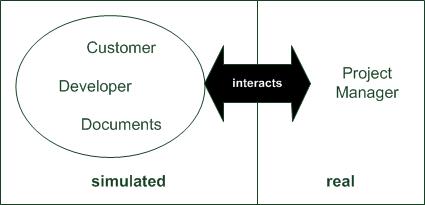SESAM - The Heart of AMEISE: Difference between revisions
No edit summary |
No edit summary |
||
| (24 intermediate revisions by 5 users not shown) | |||
| Line 1: | Line 1: | ||
{{NavigatorBar|Motivation|The QA - Model}} | |||
===Project Overview and Motivation === | |||
Good project management is one of the key factors for the successful implementation of a (software) project. Often, in the field of project management, the training of project managers is strongly neglected, and the education of a project manager is only based on theoretical knowledge. | |||
===The Simulation of Projects=== | |||
To improve the training, the SESAM-Project ('''S'''oftware-'''E'''ngineering-'''S'''imulation through '''A'''nimated '''M'''odels) has been developed at the department of Software Engineering at the Universität of Stuttgart. Besides a theoretical foundation, the education of students should be improved by some realistic components. It is not possible that every student leads a real project during a bachelor degree course, and so SESAM offers the great opportunity to train project management by simulation. The approach is also interesting for the training of future project managers in industry, as it can be accomplished quickly and cheaply. | |||
| | |||
| | |||
[[Image:Grundidee_en.gif|center]] | |||
{| style="background:#FFFFCA;padding:0.5em" | | |||
|- | |||
| In the context of training, trainees simulate projects on a simulator, where he or she is in the position of a project manager and interacts with a customer, developers and several types of documents and software code. The simulation time is divided into time sections, and the project is controlled by different commands. | |||
|} | |} | ||
The '''Training Environment''' offers trainees the following effects: | |||
* During a simulation run one learns how to use resources. | |||
* A change of resources or the development process has important consequences. | |||
* Trainees are getting confronted with situations which arise normally on real projects | |||
===Models=== | |||
The simulation is based on models that include all relevant aspects of a project. The model which is loaded in the simulator decides which project is taken. In addition to the '''QA - Model''' simulation runs are possible with other models. | |||
__NOEDITSECTION__ | |||
{{NavigatorBar|Motivation|The QA - Model}} | |||
[[de:SESAM - Der Kern von AMEISE]] | |||
[[en:SESAM - The Heart of AMEISE]] | |||
[[Category:Help]] | |||
Latest revision as of 15:31, 16 May 2013
Project Overview and Motivation
Good project management is one of the key factors for the successful implementation of a (software) project. Often, in the field of project management, the training of project managers is strongly neglected, and the education of a project manager is only based on theoretical knowledge.
The Simulation of Projects
To improve the training, the SESAM-Project (Software-Engineering-Simulation through Animated Models) has been developed at the department of Software Engineering at the Universität of Stuttgart. Besides a theoretical foundation, the education of students should be improved by some realistic components. It is not possible that every student leads a real project during a bachelor degree course, and so SESAM offers the great opportunity to train project management by simulation. The approach is also interesting for the training of future project managers in industry, as it can be accomplished quickly and cheaply.

| In the context of training, trainees simulate projects on a simulator, where he or she is in the position of a project manager and interacts with a customer, developers and several types of documents and software code. The simulation time is divided into time sections, and the project is controlled by different commands. |
The Training Environment offers trainees the following effects:
- During a simulation run one learns how to use resources.
- A change of resources or the development process has important consequences.
- Trainees are getting confronted with situations which arise normally on real projects
Models
The simulation is based on models that include all relevant aspects of a project. The model which is loaded in the simulator decides which project is taken. In addition to the QA - Model simulation runs are possible with other models.